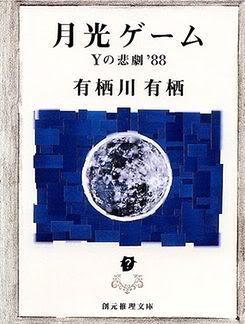 The members from Eito University's Mystery Club decide to go camping during their summer holidays and meet other students with the same idea on their way. Unfortunately the volcano next to the camping area suddenly starts to erupt after 200 years and due to landslides the students become unable to leave the mountain. The tragic situation gets even more ominous when people start to vanish or are found murdered...
The members from Eito University's Mystery Club decide to go camping during their summer holidays and meet other students with the same idea on their way. Unfortunately the volcano next to the camping area suddenly starts to erupt after 200 years and due to landslides the students become unable to leave the mountain. The tragic situation gets even more ominous when people start to vanish or are found murdered...To be honest, I more or less only read this as a part of 'set books' to understand the whole shinhonkaku development and because I (finally!) wanted to get to know Arisugawa Arisu through his actual own works and not just secondary literature on the whole genre matter. So i figured I should just start with his debut (even though this technically isn't the first work he wrote since apparently he already wrote a novel spanning over 360 pages and applied for the Edogawa Ranpo Price at the age of FIFTEEN) and it turned out to be a pleasurable read.
Nothing awe-inspiring like stuff that emerged during later shinhonkaku stages or even after the advent of the Mephisto Award, so this isn't that interesting as a novel itself, but the mystery part works out perfectly fine and I have to admit that I had no idea even when the challenge to the reader came up, even though the solution turned out to be totally logical. The mystery part does not feature anything fancy like a locked room or other impossible crimes, but it features a dying message and Arisugawa said that for him closed circles full of people without an alibi are what defines mystery novels the most so I guess this is what made him write this debut work as an actual author.
While this is a 'mere' whodunit with a dying message, I was definitely sold on Arisugawa's logical style after this novel and I'm looking forward to the next one in the Egami Jirou-/Gakusei Arisu-Series, since that one features an isolated island, a locked room AND a dying message and supposedly is a big puzzler overall.
I did say that as a novel this is not that applaudable, but I guess this was mostly due to being his debut and being published in the late 80's when the foundations for Japan's modern mystery novels where still in progress. Overall this book left a kind of disharmonious or at least unfinished impression, since the occult references to the moon's influence and Gurdjieff's theories were not uninteresting, but they felt a bit out of place and so did the character's backgrounds. They were not as forced as in Ayatsuji Yukito's jukkakukan no satsujin, but it simply felt like it could have been done in a more coherent and meaningful way. Furthermore Arisugawa's 'students in closed circle'-story did not feature a distracting side-plot. In Ayatsuji's case this certainly did serve the build-up of atmosphere, however gekkou game turned out to be more suspenseful in the end.
To put it short, you can clearly see an important step in the genre's history and I want to emphasize that at that time Arisugawa did not have such a huge pool of inspirations to choose from like current writers. If you used this setting as a writer today, you would have to include a lot more aspects to present it appealingly, but considering the time when this was already written, this can certainly be seen as a cornerstone of (post-)modern mystery novels.
Just having the subtitle Yの悲劇’88 makes me want to read it :~D
ReplyDeleteOf course, I'm pretty partial to the Queen-ish Ariusgawa, so I'll probably pick it up one time or another.